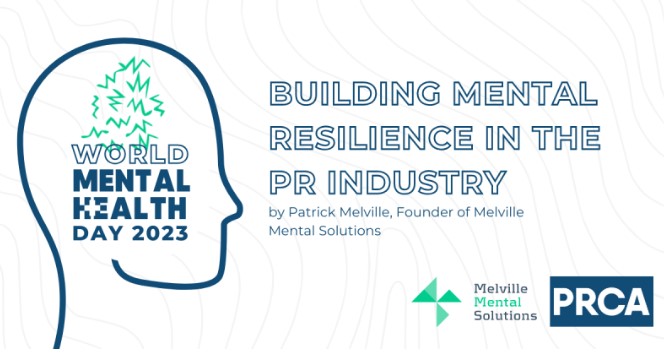When you hear the words ‘mental resilience’, what springs to mind? Words are a type of signal that our minds use to understand our situation and environment. When we encounter spoken and written words, these signals lead to positive, negative, and neutral thoughts and feelings.
Interpreting signals would be much easier if our minds were only required to manage one signal at a time but the PR sector is complicated and busy: you might receive a long and content heavy email from a potential client that requires urgent action, before having to take part an existing client’s launch event, and then you are told that you need to cover for a colleague tomorrow… Every signal presents us with a high volume of cognitive and non-cognitive information. According to Britannica’s definition of physiology our senses “gather some 11 million bits per second from the environment”.
Our minds send and receive signals. They are built on our own nature and nurture experiences, which include our genetics, background, social and cultural environment, major life events and work experiences. Everyone’s minds gives a personal and unique approach to daily lives.
The phrase ‘mental health’ is a good example of our translation. Mental health has come to the fore in recent years, but how well do we understand its meaning? It is crucial that we appreciate people’s psychological, emotional and social wellbeing if we are to carry out our daily tasks. Those who misconstrue the true meaning of the words ‘mental health’ run the risk of creating stigmas, misunderstandings and unhelpful thoughts and behaviours.
Try this simple task – take 30 seconds to answer the question: ‘Are the words ‘mental health’ a 1) positive statement, 2) neutral statement or 3) negative statement?’
The website https://www.mentalhealth.gov/ offers a clear definition:
“Mental health includes our emotional, psychological, and social well-being. It affects how we think, feel, and act”.
This definition points to the answer that it is a ‘neutral statement’; despite any feelings this might provoke! Once we understand these words, we can acknowledge the meaning of the other phrases: ‘Positive’ means ‘healthy’, and ‘negative’ means ‘ill’.
According to the Oxford English Dictionary, the phrase ‘resilience’ is ‘the capacity to recover quickly from difficulties’. It is important to focus on the word ‘quicker’. Investing into building resilience will result in a longer-term benefit. For a PR worker’s mental health, this means that the daily negative thoughts and emotions and unhelpful actions can be managed better and help to focus on the current challenges.
Building Mental Resilience not only helps to manage and recover quicker from challenges but also can lead to growth through the experience. Perhaps you have more confidence to manage a specific challenge that your thought was not possible; you now have stronger relationships and connections with colleagues or clients; or you have experience to delegate your tasks to your team and manage your busy workload.
Mental resilience gives both the confidence internally and externally. It provides the confidence and mental space to review a list of tasks in a rationale way, and not in an emotionally stress driven way. According to Positive Psychology the benefits of resilience to the mind include: problem solving, goal setting, effective communication, emotional regulation/stress management, building a support network, using a personal self-care practice, clarifying meaning and purpose, stronger focus on the positives, increase self-awareness and confidence to use coping strategies.
Building mental resilience is a positive approach to working in the PR industry. According to the Mental Health Foundation ‘good mental health’ is when “we feel good inside. We might feel calm or content, peaceful, hopeful, and accepting of ourselves and valued by the people who matter to us”.
PRCA is partnering with Melville Mental Solutions (MMS) to run a free wellbeing programme under the theme of Mental Resilience. The programme will focus on the approaches used in and outside the industry to give tips about taken on the next challenges and celebrate success, no matter how small. Some of the key programme goals include to enhance mental health services, promote mental health awareness, provide value to PRCA Members, align with industry events and share educational opportunities. The programme will be running a series of podcasts interviewing agencies (and other contacts?) and a Wellbeing library on the PRCA website.


